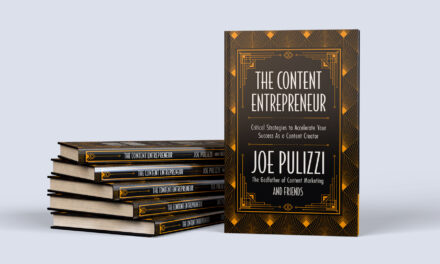I’m addicted to learning. Books, blogs, podcasts, YouTube channels: I try to learn tactics and strategies everywhere. I fell in love with the stories of many high achievers – those million-dollar success stories.
It seemed if I could peek behind the curtain, I could replicate their feats. Those stories felt inspiring. But I don’t like them anymore. More often than not, they steer us away from the realization of our content entrepreneur dreams.
More often than not, stories of entrepreneurs' mega success steer creators away from realizing their #ContentEntrepreneur dreams, says @MrCabasVidani. Share on XDoes it sound strange? Let me explain and share a better way to find and study success stories that can actually help you and your content business.
Every business success book talks about an Apple or Airbnb. Every tutorial about how to grow on YouTube talks about MrBeast or Casey Neistat.
We like those stories because they are like superhero movies. We want to be the heroes. They also depict the heroes as overnight successes. We surely want that.
We only see the tip of the iceberg. We see the view count, the seven-figure revenue, the amazing product launch. But there are many things we never know:
- How long did it really take?
- How many failures occurred before the big success?
- What did the entrepreneur sacrifice to achieve it?
- How is the entrepreneur really feeling now that they’ve achieved phenomenal success?
- Does success look like what they hoped for?
When we look at our own content businesses, we are painfully aware of the answers to those questions. Our negativity-biased mind amplifies the negatives and disregards the positives in our own story.
Entrepreneurs want to be superheroes like @Apple and @MrBeast, but we only see the tip of the iceberg in what it takes to become those mega successes, says @MrCabasVidani. #ContentEntrepreneur Share on XSo, there’s a sort of selective blindness when we consider exceptional success stories. It tricks our psychology in several ways.
Success mistake no. 1: We expect a quick, huge win
Our heroes’ achievements came almost overnight (or at least it seems so). Thus, there must be a way to succeed quickly. We launch our blog, publish 24 posts in three months, and … analytics barely make a blip, no sales happen, and no fame is gained.
Depressed and discouraged, we turn to another channel or content tilt. Or we quit our entrepreneurial dreams altogether.
Realistic expectations would make us more patient and allow us to stay focused on what we set out to do.
Success mistake no. 2: We think entrepreneurship is unicorns and rainbows
The first months, even years, of any content entrepreneur’s journey are a path toward discovery. We need to find our channel, our tilt, our audience, and our monetization strategy.
As we hone our skills, we expect to be like skateboarder Tony Hawk doing a 720 on a 100-foot ramp. When in reality, we are more like toddlers, making their first tiny, shaky steps between the couch and their parent’s arms.
Because we don’t recall or never knew our creator heroes’ missteps and failures, we think our mistakes are a sign of being on the wrong path. We don’t take enough time to see if our original content strategy can lead to success.
Learning from our mistakes rather than seeing them only as failures can help strengthen our perspective and our business.
Mega-success mistake made by #ContentEntrepreneurs: Thinking it's all unicorns and rainbows where no one ever fails, says @MrCabasVidani. Share on XSuccess mistake no. 3: We need outsized success
Big success stories are magnetic because they are exceptional. If they were more mundane, fewer people would notice or recall them.
But we forget that. We convince ourselves that our heroes’ exceptional success is the only success acceptable for our business.
Even if that’s our ultimate fate, we won’t jump directly from zero to hero. We likely will grow slowly. For a long time, nothing will suggest that we’ll become a case study in a business book.
To achieve big success, set more realistic goals that can be accomplished in the short and long term. By achieving each goal, we can feel successful and are more likely to progress to the next success.
Success mistake no. 4: We must follow the same path
A handful of omnipresent case studies usually depict a restricted subset of all possible paths to success. We get frustrated if our path doesn’t look like our heroes.
There are endless ways to succeed. It may be our hero’s path, but it is more likely to be a path that we carve out for our unique environment, business, audience, etc.
Should we give up on inspiring entrepreneur stories?
I’m not saying we should never try to learn from other entrepreneurs. But we should take phenomenal success stories with a grain of salt. We should carefully choose our inspirations and terms of comparison in the same way we source ingredients and recipes for a healthy diet.
Learn from hugely successful entrepreneurs but take their stories with a grain of salt. They're outliers, says @MrCabasVidani. Share on XIn a single sentence: Don’t look for outliers. Instead, strive to consume many helpful entrepreneur stories and identify patterns of success.
Fortunately, this is easy to do nowadays:
- Find and analyze the stories of lesser-known entrepreneurs in your field.
- Add stories from other fields to maximize your creativity.
- Keep only the stories that go in-depth and study their origins.
- Read, listen, and watch different stories to enlarge your knowledge circle.
- Look for situations similar to yours with results you’d like to have.
- Find the common patterns, sequences of actions, and outcomes and apply those that best fit you and your business.
- Keep learning and expanding your story sources.
For example, every issue of TheTilt’s newsletter shares the story of a content entrepreneur. They are never the big names in their fields. Some of them catch my attention because of the field they’re in, the kind of content they produce, or the way they monetize. I take note of them. As more of these stories confirm the effectiveness of those tactics, I infer they generally work, so I try them in my business.
About the author
Alberto has been a content entrepreneur since 2010, writing posts, producing videos and podcasts, and selling ebooks, courses, and services. Now he helps content creators become consistent through coaching at https://www.coach.me/albertocabasvidani.










